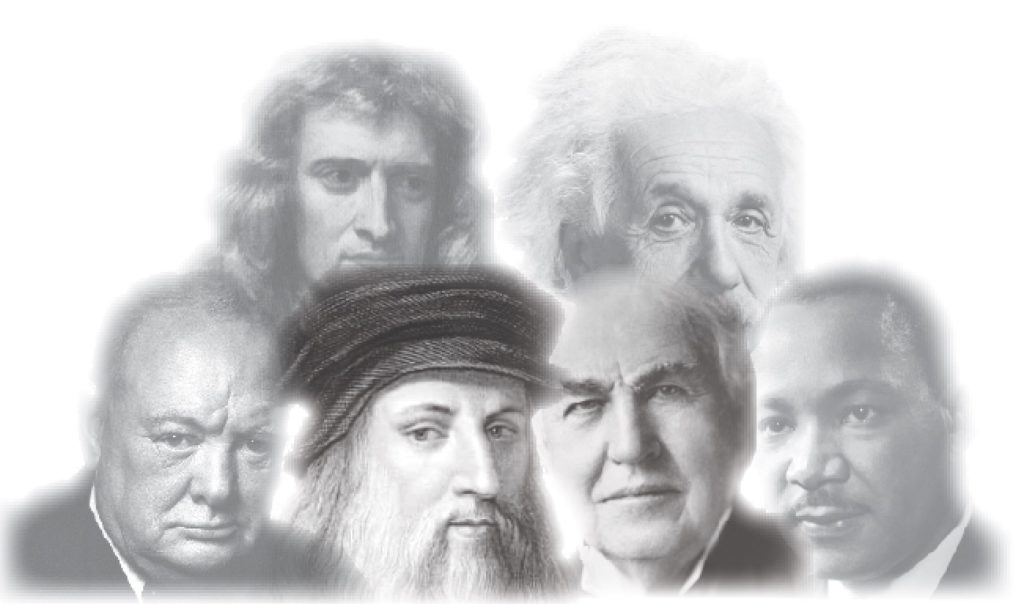
Genius seems to emerge gradually from a combination of neural proclivities, along with a variety of personality traits. Recent research reveals that about 70 to 80% of the variance in intelligence among individuals is attributable to the genes they inherit. This means that the neurological structure of a person’s brain can predispose them to intellectual achievement. However, this is only one component of genius. Many personality attributes are necessary to harness the potential of a highly efficient brain for the creation of works of genius. The qualities listed below are distilled from the biographies of some of the world’s greatest geniuses. They probably represent necessary, though not sufficient, attributes for the creation of works of genius.
Curiosity
Leonardo da Vinci, Newton, Darwin, Einstein and Hawking were all engrossed in the world around them to the point of total engagement. During a voyage of almost 5 years that took Charles Darwin around the world, the young naturalist was consumed with a burning curiosity about all the flora and fauna that he observed. He kept detailed, copious notes of everything he saw and shipped suitcases of fossils, skeletons, and other artefacts back to England for further study. In his epoch-making treatise On the Origin of Species by Means of Natural Selection, published on November 24, 1859 he marshalled his extensive data to make a strong case for the principle of natural selection as the mechanism driving evolution. To make his case for evolution, he drew from his observations in the Galápagos, noting that variations in a species differ from each other in proportion to their geographical separation:
Why should the species which are supposed to have been created in the Galapagos Archipelago, and nowhere else, bear so plain a stamp of affinity to those created in America? … I believe this grand fact can receive no sort of explanation on the ordinary view of independent creation;. … Many analogous facts could be given: indeed, it is an almost universal rule that the endemic productions of islands are related to those of the nearest continent, or of other near islands.
From this observation emerged the dual concepts of evolution and natural selection that changed forever the way we humans understand our origins. Darwin’s unrelenting curiosity about the origins of the different varieties of plants and animals, combined with an ability to discern patterns and draw inferences, enabled him to create works of genius.
Passion
All the geniuses mentioned above were consumed with an insatiable passion for their work, prompting them to seek the isolation that would enable them to work uninterrupted. Isaac Newton isolated himself on the farm in Wooolsthorpe during the plague of 1664–65, when he developed his Law of Universal Gravitation and differential calculus. He never married and dedicated his life to an intense investigation of everything that piqued his curiosity.
Einstein was also reclusive during most of his life, constantly insisting, “I need my peace to do my work.” His second wife, Elsa, served as his personal buffer against visits from unwanted guests who might squander his time. Like Archimedes of Ancient Greece and Isaac Newton, Einstein was almost always engaged in thinking about his work. It was his sole passion.
Stephen Hawking, stricken with ALS at an early age, was eventually confined to a wheelchair and his only escape from that captivity was his total engagement with physics and astronomy.
Described as the “quintessential Renaissance Man,” Leonardo da Vinci–a person compelled by an insatiable curiosity to address the broadest spectrum of intellectual disciplines ever embraced by a human being–became the icon for the polymath. His passion for achieving perfection in representing the human form impelled him to study human physiology, the geometry of perspective and a variety of other disciplines.
Creativity
Leonardo da Vinci could also serve as a model of creativity. His unrelenting creative talents extended well beyond the visual arts to technological innovation. He sketched plans for helicopters, flying machines, perpetual motion machines, and a host of other engineering artifacts–some viable and some not.
Characterizing this dimension of genius, his biographer, Walter Isaacson wrote:
What made Leonardo a genius, what set him apart from people who are merely extraordinarily smart, was creativity, the ability to apply imagination to intellect. …What also distinguished Leonardo’s genius was its universal nature. The world has produced other thinkers who were more profound or logical, and many who were more practical, but none who was as creative in so many different fields.
Abstraction
All the geniuses mentioned above displayed an outstanding ability to generalize discrete observations into patterns that could be formulated as general principles. Darwin’s principle of natural selection, Newton’s Law of Universal Gravitation, and Einstein’s formulation of his Field Equation were all overreaching principles that created new paradigms for understanding a wide variety of natural phenomena.
The geniuses in our species have contributed so much to our knowledge of ourselves and our universe and we are greatly indebted to them, because the gems they uncovered came at great personal sacrifice. Many dealt with isolation, some were financially stressed and others had little or no family life. We are all beneficiaries of these people who had these wonderful qualities and made the necessary sacrifices, yet we may think twice before we aspire to follow in their tracks. As the Chinese proverb advises, “Be careful what you wish for.”
